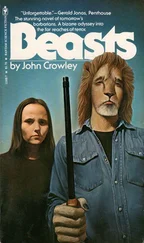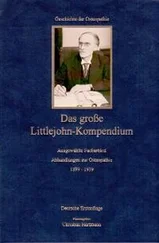(Later on, it was Smoky’s habit to try to sort out his half-siblings and their houses and assign them to their proper cities and states while he sat on the toilet. Maybe that was because it was in their toilets that he had felt most anonymous, anonymous to the point of invisibility; anyway, he would pass the time there shuffling his brothers and sisters and their children like a pack of cards, trying to match faces to porches to lawns, until late in life he could deal out the whole of it. It gave him the same bleak satisfaction he got from solving crossword puzzles, and the same doubt—what if he had guessed words that crossed correctly, but weren’t the words the maker had in mind? The next-week’s paper with the solution printed would never arrive.)
His wife’s desertion didn’t make Barnable less cheerful, only more anonymous; it seemed to his older children, as he coalesced in and then evaporated from their lives, that he existed less and less. It was only to Smoky that he gave the gift of his private solidity: his learning. Because the two of them moved so often, Smoky never did go to a regular school; and by the time one of the states that began with an I found out what had been done to Smoky by his father all those years, he was too old to be compelled to go to school any more. So, at sixteen, Smoky knew Latin, classical and medieval; Greek; some old-fashioned mathematics; and he could play the violin a little. He had smelled few books other than his father’s leather-bound classics; he could recite two hundred lines of Virgil more or less accurately; and he wrote in a perfect Chancery hand.
His father died in that year, shriveled it seemed by the imparting of all that was thick in him to his son. Smoky continued their wanderings for a few more years. He had a hard time getting work because he had no Diploma; at last he learned to type in a shabby business school, in South Bend he later thought it must have been, and became a Clerk. He lived a lot in three different suburbs with the same name in three different cities, and in each his relatives called him by a different name—his own, his father’s, and Smoky—which last so suited his evanescence that he kept it. When he was twenty-one, an unknown thrift of his father’s threw down some belated money on him, and he took a bus to the City, forgetting as soon as he was past the last one all the cities his relatives had lived in, and all his relatives too, so that long afterwards he had to reconstruct them face by lawn; and once arrived in the City, he dispersed utterly and gratefully in it like a raindrop fallen into the sea.
He had a room in a building that had once been the rectory of the very old church that stood revered and vandalized behind it. From his window he could see the churchyard where men with Dutch names turned comfortably in their old beds. In the morning he got up by the clock of sudden traffic—which he could never learn to sleep through as he had the long thunder of Midwestern trains—and went to work.
He worked in a wide, white room where the little sounds he and the others made would rise to the ceiling and descend again strangely altered; when someone coughed, it was as though the ceiling itself coughed, apologetically, with covered mouth. All day long there Smoky slid a magnifying bar down column after column after column of tiny print, scrutinizing each name and its attendant address and phone number, and marking red symbols next to those that were not the same as the name and address and phone number typed on each card of stack after stack of cards that were piled daily next to him.
At first the names he read were meaningless to him, as deeply anonymous as their phone numbers. The only distinction a name had was its accidental yet ineluctable place in the alphabetical order, and then whatever idiot errors the computer could dress it in, which Smoky was paid to discover. (That the computer could make as few errors as it did impressed Smoky less than its bizarre witlessness; it couldn’t distinguish, for instance, when the abbreviation “St.” meant “street” and when it meant “saint,” and directed to expand these abbreviations, would without a smile produce the Seventh Saint Bar and Grill and the Church of All Streets.) As the weeks fell away, though, and Smoky filled up his aimless evenings walking block after block of the City (not knowing that most people stayed inside after dark) and began to learn the neighborhoods and their boundaries and classes and bars and stoops, the names that looked up at him through the glass bar began to grow faces, ages, attitudes; the people he saw in buses and trains and candy stores, the people who shouted to each other across tenement shaftways and stood gaping at traffic accidents and argued with waiters and shopgirls, and the waiters and shopgirls too, began to mill through his flimsy pages; the Book began to seem like a great epic of the City’s life, with all its comings and goings, tragedies and farces, changeful and full of drama. He found widowed ladies with ancient Dutch names who lived he knew in high-windowed buildings on great avenues, whose husbands, Estates of, they managed, and whose sons had names like Steele and Eric and were intr dcrtrs and lived in Bohemian neighborhoods; he read of a huge family with wild Greeksounding names who lived in several buildings on a noisome block he had walked once, a family that grew and discarded members every time he passed them in the alphabet—Gypsies, he decided at last; he knew of men whose wives and teenage daughters had private phones (on which they cooed with their lovers) while their men made calls on the many phones of the financial firms that bore their names; he grew suspicious of men who used their first initials and middle names because he found them all to be bill collectors, or lawyers whose bsns had the same address as their rsdnce, or city marshals who also sold used furniture; he learned that almost everyone named Singleton and everyone named Singletary lived in the northern black city where the men had for first names the names of past presidents and the women had gemlike names, pearl and ruby and opal and jewel, with a proud Mrs. before it—he imagined them large and dark and glowing in small apartments, alone with many clean children. From the proud locksmith who used so many A’s in his tiny shop’s name that he came first to Archimedes Zzzyandottie who came last (an old scholar who lived alone, reading Greek newspapers in a shabby apartment) he knew them all. Beneath his sliding bar a tiny name and number would rise up like flotsam borne up a beach by waves and tell its story; Smoky listened, looked at his card, found them the same, and was turning down the card even as the distorting glass threw up the next tale. The reader next to him sighed tragically. The ceiling coughed. The ceiling laughed, loudly. Everyone looked up.
A young man who had just been hired had laughed.
“I’ve just found,” he said, “a listing here for the Noisy Bridge Rod and Gun Club.” He could barely finish it for laughing, and Smoky was amazed that the silence of every other proofreader there didn’t hush him. “Don’t you get it?” The young man appealed to Smoky. “It sure would be a noisy bridge.” Smoky suddenly laughed too, and their laughter rose to the ceiling and shook hands there.
His name was George Mouse; he wore wide suspenders to his wide pants, and when the day was done, he threw around himself a great woolen cloak whose collar trapped his long black hair, so that he must reach back and flip it out, like a girl. He had a hat like Svengali’s, and eyes like him too—dark-shadowed, compelling, and humorous. It wasn’t a week later that he was fired, to the relief of every pair of bifocals in the white room, but by then he and Smoky had become, as only Smoky in the whole world it seemed could any longer say with all seriousness, fast friends.
Читать дальше












